The Importance Of A Sustainable And Healthy Diet
Times Evoke
A New Leaf
Food is among humanities greatest joys. From savouring special delights to sharing food, how we eat symbolizes our deepest bonds. However, worryingly, the way we now consume food could soon consume us – the world’s food, once richly biodiverse, is now heavily composed of processed animal products. Global meat production has quadrupled since 1961, with over 340 million tonnes produced annually. Demand and supply feed each other. Over half the world’s land is used for agriculture, of which 77% is used to rear animals – one third of Earth’s arable land is used only to grow feed to fed livestock.
Such industrially processed food is damaging us, causing heart disease, diabetes, obesity and cancers worldwide. Alongside, it is wrecking the Earth – livestock based agriculture causes 14.5% of greenhouse gas emissions, driving climate change. Animal based food production demands deforestation – 70% of the amazingly biodiverse Amazon rainforest has been destroyed to house animal ranches and grow livestock feed – while chemical fertilizers are damaging water and soil. As the Earth is degraded, it will lose it’s ability to produce the crops needed to feed us. Our unthinking consumption is over-sating us now – and leading to a future of deprivation.
Clearly, what harms nature harms us, and scientists have thus formulated the planetary health diet – an endeavour which unites the well-being of the world and an individual’s health in something as simple as our daily bread. The diet only requires lowering animal based consumption and increasing plant-based dietary options. A large-scale shift to this would mean that vast tracts worldwide reducing emissions and toxins. Importantly, such a diet could lead to twelve million premature losses of life averted annually – the difference that would make to us and our families is immeasurable. The planetary health diet is a compelling idea, and as two-thirds of Americans reduce their meat consumption now, one whose time has come. As times Evoke global experts emphasize, multiple partners, from the media to educationists, governments to food industries, can help this transition – but the change starts with you. Join Times evoke on a fascinating journey of food, whereby we can all turn over a vibrant new leaf.
‘Life cycle analyses shows a plant-based diet is most nutritious with least environmental impacts’
Walter C Willet is professor of epidemiology and nutrition at Harvard University’s TH Chan School of Public Health and professor of medicine at Harvard Medicalp school. Co-chair of the well-known EAT-Lancet commission, the eminent scholar spoke to Srijana Mitra Das at Times evoke about why adopting a plant-based diet is so important for our own health – and the sustainability of our planet:
Why does the EAT-Lancet study argue that the consumption of meat is deeply harmful for the planet?
With the world’s population heading towards ten billion by 2050, the current consumption of meat – and the global trends towards even higher intakes – means destroying forest for pastures and increasing the industrial production of grains to feed animals. This is leading to greater greenhouse gas emissions, pollution from fertilizers and species extinction. Also, ruminants emit methane, which is a potent greenhouse gas, further intensifying climate change. Thus, meat products have the worst environmental impacts.
We have found that the direct consumption of whole-grains, legumes, nuts, seeds, fruits and vegetables are nutritionally the most efficient and these have the least environmental impacts. We have learned this from ‘life cycle analyses’ which account for all the inputs and outputs in the production of specific foods. Every individual must now make food choices that support their own health, their family’s health and that of our planet. We have strong evidence that this can be achieved by adopting largely plant-based diets, which draw on food traditions from around the world that developed over thousands of years.
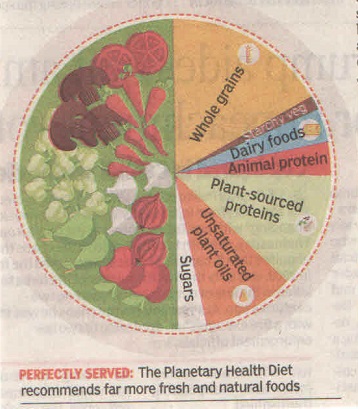
How does adopting a plant-based diet help to feed a growing global population?
It is much more efficient to eat plants directly rather than to feed them animals and then eat the animals. In our analyses, we found that for the global community, we could sustainably produce about two servings of animal-sourced foods per day, one being dairy and the other being a flexible combination of red meat (about once a week) poultry and fish (twice a week) and eggs.
If the amount of dairy or meat were to be increased much beyond these numbers, this would simply not be environmentally sustainable – and the global degradation involved would then threaten global food production.
Is a plant-based diet nutritionally adequate?
Almost all the nutrients in meat can be obtained by eating nutrient-rich plants. An exception is vitamin B-12 – if someone eats little or no meat or diary food, taking a supplement is essential. Importantly though, meat, especially red meat, comes with saturated fat, cholesterol and other constituents that increase the risk of cardiovascular – reducing red meat with plant protein reduces bad cholesterol. In long-term studies, this predicts lower rates of heart disease.
Which countries perform well in terms of a healthy and sustainable diet? And where does India stand?
We’ve ranked countries by the healthfulness of their diets – this is strongly correlated with sustainability, because these diets are more plant-based. The countries around the Mediterranean are among the best, especially Turkey and Israel, while countries in southeast Asia, including Vietnam and Japan, also ranked high.
That said, all countries have much room for improvement as the best ranked about 65 on a scale of 100 – India scored about 50, its positive aspects provided by traditional whole-grains and legumes and relatively low amounts of red meat.
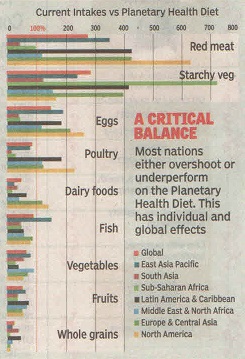
With rising affluence though, both India and China are seeing significant dietary shifts. What are the implications of this?
Certainly, in many parts of India, healthy and sustainable traditional diets are being displaced by more meat and refined starches and sugar. These are part of heavily promoted industrial diets which have adverse effects on individual and planetary health. China’s red meat intake has now caught up with consumption levels in the US. Alongside environmental impacts, such changes are fuelling epidemics of obesity and diabetes. We need to reverse these trends for health and sustainability reasons.
China has officially adopted a policy to reduce the consumption of red meat as this can reverse the progress made in health and economics. Also, it isn’t inevitable that red meat consumption must increase with income – we see it declining in more educated groups in the US now as people learn about the benefits of plant-based diets. Almost all the recent growth in the food retail sector has been in plant-based options. Today, people can also incorporate healthy foods from around the world in their diets – soy foods, for example, weren’t traditionally a part of the Indian diet, but many soy-based dishes from across Asia provide flavourful and healthy options.
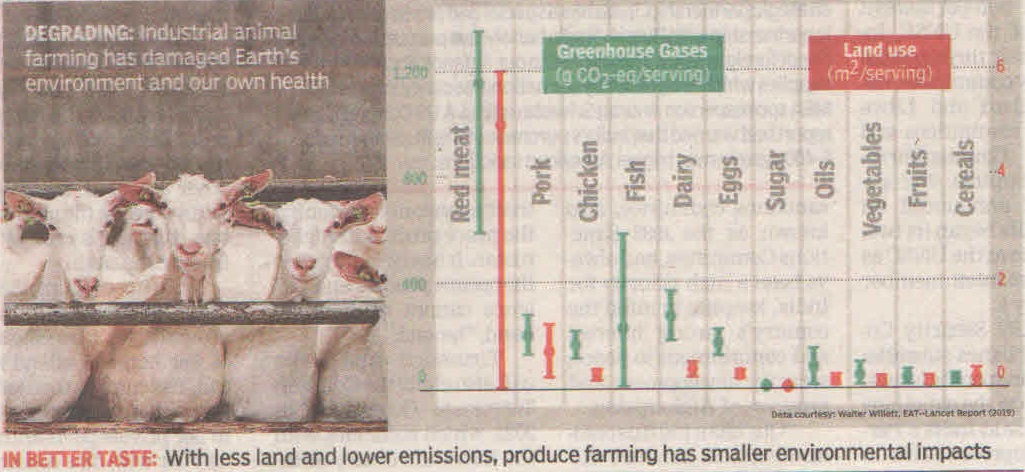
What are your recommendations for developed countries like the US, whose dietary preferences have impacted the global environments?
The US should be decreasing the consumption of red meat, refined starches, sugar, potatoes and salt, and increasing the intake of fruits, vegetable, whole-grains, legumes, nuts and fish. Again, people with higher education and incomes are improving their diets – but those with lower incomes and education are not being able to do this. Overall, rates of obesity, diabetes, cardiovascular disease and obesity-related cancers are going up – and life expectancy is going down.
Given the importance of a plant-based diet, should governments intervene to popularize this?
Worldwide, government policies, such as subsidies, taxes, research and infrastructure support, play a major role in determining the food we eat – unfortunately these policies often support diets that are neither healthy, nor sustainable. Each country should ensure the production and consumption of healthy and sustainable for everyone – this is a matter of justice and our collective future.
Consuming the World
• The meat and airy industry use one-third of Earth’s freshwater – reducing the consumption of animal products by half would lessen an American’s average dietary requirement of water, 5,000 litres daily, by 37%
• Agriculture causes 30% of greenhouse gas emissions – livestock equals 14.5%. A plant-based diet could reduce an individual’s carbon footprint by 70% – if every American consumed one serving of chicken less per week, CO2 emissions saved would equal removing 5,00,000 cars from the road
• One and a half acres of land can produce 375 pounds of meat or 37,000 pounds of plant food – a meat eater thus needs 18 times the amount of land compared to someone following a plant-based diet
• 85% endangered wildlife species face habitat loss due to land turned to cash crops or cattle feed – from elephants to bees, one million species now face such extinction
• Industrial agriculture drives 80% global deforestation. By cutting down meat and dairy consumption, global farmland use could be reduced by 75% – that’s equal to the US, china, EU and Australia combined – and still feed the world. Currently, meat and dairy use 83% farmland, produce 60% agricultural greenhouse gas emissions – and provide only 18% calories globally.
‘Food needs re-thinking – our planetary boundaries are at breaking point’
Marco Springmann is senior researcher of public health and sustainability at Oxford University. A leading expert on non-communicable disease prevention, Springmann shares his insights with Times evoke on the breaking point industrial food systems have created, what the planetary health diet offers the world –and how India currently eats.
We now know that our food system is at breaking point – many of our planetary boundaries are at risk of being exceeded due to current food production models. According to our projections, the pressure on earth placed by the food system could increase by up to 90% within a few decades, exceeding all planetary boundaries for climate change, involving water use, land use and biochemical use through nitrogen and phosphorus related to fertiliser application. This is a grim scenario but it is logical, considering that the food system is currently responsible for one-third of all greenhouse gas emissions. A major driver of climate change, it uses three-quarters of the world’s freshwater, over 40% of the Earth’s land surface (which is thereby lost to multiple plant and animal species), causes deforestation and damage through chemical fertilisers.
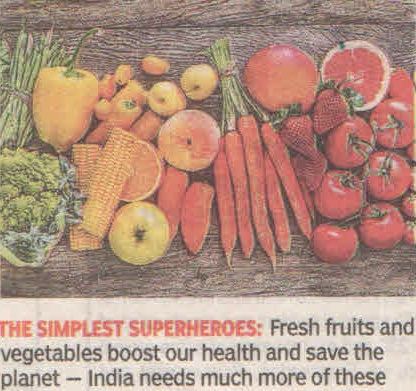
Such industrial food is very poor for individual health as well. Chronic diet-related diseases, like heart ailments, strokes, diabetes and certain cancers, are caused by the increased consumption of red and processed meats. Such unhealthy diets have now become one of the biggest causes of premature mortality the world over. The planetary health diet therefore been formulated to meet twin challenges – environmentally unsustainable food systems and unhealthy diets. It’s recommendations are simple – we shouldn’t have red meat more than once a week, or fish or poultry more than twice a week. We can have one serving of diary per day and plenty of fruits, vegetables, and whole-grains daily. And we should certainly eat a handful of nuts every day.
These recommendations suit everyone, from low-meat flexitarians to those on vegetarian, vegan and pescatarian diets. The recommendations perform very well on nutritional adequacy, health and environmental impacts – they reduce many nutrient shortfalls and provide greater risk reduction for dietary-related mortality. They also stay within environmental limits. Therefore, the planetary health diet increases human longevity with better health – and planetary longevity with sustainability.
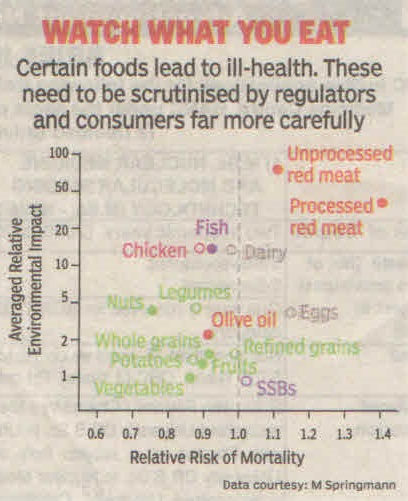
However, I’m often asked why, despite all the information being available to them, well-placed individuals don’t make better dietary choices. The answer lies in the public health term ‘food environment’ – what we eat is what we’re exposed to, what our friends eat, what’s available easily in our markets, what’s affordable. At the moment, in many countries, this environment encourages the consumption of unhealthy and unsustainable foods. If you go out for a meal, you’re frequently surrounded by options which are mostly meat-based or highly processed foods. The fact is, the food industry doesn’t yet have health or environmental impacts as its guiding principles. So far, it’s worked for the industry to make foods which are fairly addictive in terms of sugar, oil, etc. It is unlikely they will be able to evolve from this without some encouragement. We therefore need better regulation by policy makers. Certain foods are making us and the planet sick – these need to be more expensive and less available now. And the food industry needs to be supported to meet targets for health and sustainability.
We should also think of food very differently now. Simply observing the Covid-19 pandemic highlights the importance of diets. Data shows how the virus has more sharply impacted those with pre-existing conditions, many of these being linked to unhealthy and unsustainable diets. It also shows how we are disrupting ecosystems – if we keep animals unused to each other or humans in close contact, such illnesses will only grow. The way we think of food itself needs major rethinking now.
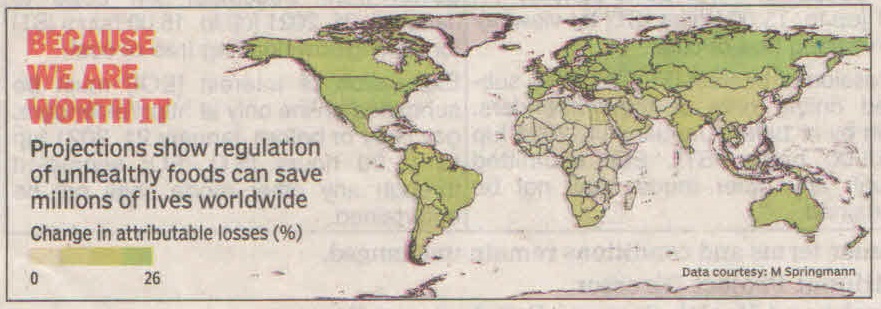
The situation in India is slightly different – as many Indians are still vegetarian, it is actually one of the few countries where diet stays within planetary boundaries. If everyone ate like an Indian, we wouldn’t be in such trouble. However, the healthiness of our diets in India can also be improved. In our surveys we found that fruit and vegetable consumption is much too low in India. These are extremely healthy and have very low environmental impacts. But, on average, India eats about 50% too little of fruits and vegetables. We also found too much consumption of white bread and white rice. Switching to brown rice and wholegrain bread would be a great improvement because the bran fibre in these is very helpful in terms of reducing chronic diseases. And, of course, the availability of enough food – an issue which still troubles India, with one of the biggest incidences of underweight people – must also be addressed.
‘Indian diets were both scientific and sustainable – these must be saved”
Sunita Narain is an environmentalist and director general of the Centre for Science and Environment (CSE). Sharing her perspective with Times evoke, the renowned ecologist discusses the role food once played in indigenous Indian culture, the impact of food commodification – and why we must reclaim the food science we always knew:
Speaking of the best diets, we must first distinguish between the earlier food consumption habits of India and the way these have changed now. We should actually celebrate how our food consumption habits used to be – India’s dietary patterns have shown that food was very connected to the local ecosystem. It was ecologically diverse – every part of India celebrated its biodiversity through its food culture. The traditional Indian food habit was possibly the most biodiverse diet of the world. Of course, other diets were similar before they were changed into monoculture diets where everybody eats rice, wheat and a hamburger. But Indian diets were truly remarkable in how they optimized biodiversity and local ecologies. Individual health, local foods and seasonal factors all came together in our diet. This was intuitive in terms of what works for you because of the environment in which you live. And it was intuitive about your local ecology and the plants and foods grown around you.
The indigenous Indian diet understood that food, built into our day-to-day lives, is one of the most powerful forms of medicine we have. But these systems of belief and practice were disrupted by the force of the market. From being medicine which strengthened us, food has become a marketable commodity now. What you eat at home or learn from your local cuisine is changing because you’re now designing your diet based on aspiration, on what others eat, on what is supposed to be modern and what is easily available – this transmutation is happening because of the power of markets, food companies and food commodification.
Once, many of us were taught about hot foods, cold foods or foods you should eat seasonally. Now, of course, there is nothing called a season because you can get the same food across the whole year. But there was a scientific reason to eat something in a particular season – this was for the goodness food gave you at that time of year. You don’t eat dry fruits in summer, for instance. These are traditionally eaten in winter because of the warmth they give you in colder months.
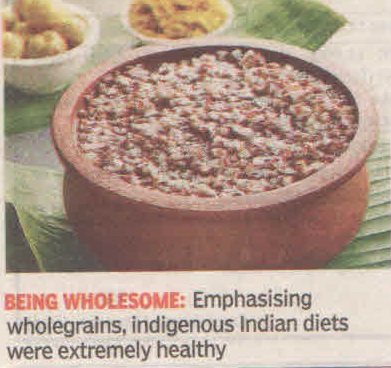
This science of food, interwoven into the art of the diet, is something we grew up with. But we’re discounting such indigenous knowledge now because of the signals we get from the outside world, which teaches you food must be packaged (even though it may not be good for you) and it must be addictive.
Food has also come to mean overindulgence – the meat industry now produces unbelievable amounts and does so using massive numbers of chemicals and destroying vast forests. Further, people are now eating so much meat, this is seriously damaging their health. Both our bodies and our environment need us to return to indigenous diets and plant-based choices – these are much healthier for us. And these will empower us to feed more people from a less degraded Earth.
Such a dietary change should not be an elite fad or a momentary trend. Instead, our indigenous dietary cultures – emphasizing local and seasonal foods, diets high in vegetables and fruits, wholegrains and legumes, cuisines with antioxidants, probiotics, etc. – should be accessed by everyone on a daily basis. We need to bring food biodiversity out of the wild onto our plates and empower farmers to grow biodiverse foods.
It is important to see food through three lenses – moderation, livelihoods for food growers and benefits for the environment. We need a tremendous change in consciousness for this and the media can play a leading role here. Schools are also very important because nutritional education can have a huge impact. And we need governments to step in as regulators and tighten rules on really bad foods. Alongside, the food industry should also be more transparent – it should, for instance, put information out properly, so people know what they’re eating. Consumers have the right to know – and we shouldn’t be discouraged by strategies like really small-point food labelling with no information that is of use to us.
Such a change in food consciousness won’t come about a moment too soon. I’m very concerned about the rise in India of junk food and foods highin salt, sugar and fat now. India has developed a huge problem with obesity and food is a major cause of this. Where our food was once medicine, it’s turning into poison now. We should stop such consumption before this turns all-consuming.
How India Once Ate
• Indigenous Indian foods are based on a mix of dietary science, locally grown crops and philosophy – ancient texts believed that food formed the basic part of a cosmic moral cycle. The four Vedas describe diverse grains – the Rig Veda discusses barley while others outline lentils and millets. The everyday khichdi, made of rice and lentils, is mentioned in these canons.
• Food science developed voluminously in India – according to ayurveda, food drives our physical, temperamental and mental states – therefore, a stable and healthy diet is essential. Foods were classified as ‘satvika’ or vegetables, milk, fruits and honey for the wise and calm, ‘tamasika’ or provoking, intense foods like meats, garlic and overly spiced dishes and ‘rajsika’, like oils and fats, endowing people with energy for daily needs.
• Indigenous Indian diets emphasized fresh fruits (using even their flowers and stems), nutritive vegetables and herbs like the bitter gourd, spinach, curry leaves and cauliflower, wholegrains like amaranth, buckwheat and maize, spices like turmeric and cumin, jackfruit and mustard seeds and regionally diverse nuts from almonds and cashews to coconuts.
What is a healthy and sustainable diet?
The EAT-Lancet Lecture – Johan Rockström
& Walter Willett
The diet that helps fight climate change
Future of Food – Feeding
the World in a Sustainable Way
| Chiara Cecchini | TEDxKlagenfurt
0 thoughts on “The Importance Of A Sustainable And Healthy Diet”